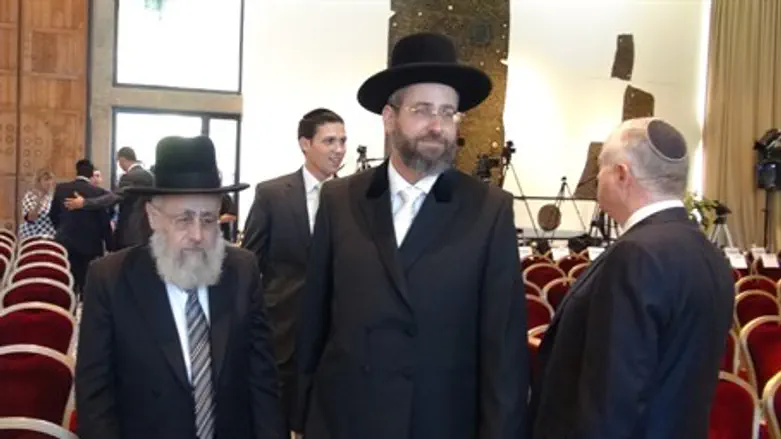
The Ministry of Justice and Ministry of Religious Affairs distributed a memorandum for a proposed bill calling for only one Chief Rabbi. The bill furthermore would separate the Beit Din Rabbinic Court system from the Chief Rabbinate.
Justice Minister Tzipi Livni (Hatnua), Economics Minister Naftali Bennett (Jewish Home) and Deputy Minister of Religion Rabbi Eli Ben-Dahan have made the memorandum of the Chief Rabbinate Bill 2013 open to the public.
While Livni and Bennett have been at odds over religious issues in the past, back in July during the election of the Chief Rabbis the two MKs expressed their intention to change the law so that there be only one Chief Rabbi.
The current bill is designed to do precisely that, having there be only one Chief Rabbi of either Sephardic (Middle Eastern/Mediterranean tradition) or Ashkenazic (European tradition) background preside over the Chief Rabbinate Council.
Currently the Chief Rabbinate is jointly headed by a Chief Ashkenazic Rabbi, a post now held by Rabbi David Lau, and a Chief Sephardic Rabbi, currently Rabbi Yitzchak Yosef. In the current system, one of the two Chief Rabbis serves as head of the Supreme Rabbinical Court, which is one of the factors necessitating two Chief Rabbis.
The proposed law addresses this issue by separating the Supreme Rabbinical Court system from the institution of the Rabbinate. Drafters of the bill noted that currently the Chief Rabbis are appointed head of the Rabbinic Court even if they aren't recognized as a Dayan (religious judge).
The memorandum states that the Chief Rabbis and Chiefs of Regional Religious Courts, also affected by the bill, will continue serving in their roles until the end of their appointment.
Livni said of the memorandum "the time has come for their to be one Rabbi for one people...that will unify all the different parts of Israeli society, a Rabbinate that will serve all groups" such as Ashkenazim and Sepharadim. Livni further claimed it was possible to honor each tradition without separating the higher religious authorities.
Bennett called the law an "important step signifying the unity of the people," adding that today when Jews from Ashkenazic, Sepharadic, Yemenite and all other groups are marrying each other, "it is understood that there's no reason for two Chief Rabbis."
Aside from the change in the Chief Rabbinate, the bill would also alter the appointment of the President and Vice-President of the Supreme Rabbinical Court. Those positions will be given to candidates from among the Dayanim (religious judges) of the Supreme Rabbinical Court, in a similar fashion to the appointment of the President and Vice-President of the civil Supreme Court.
An additional amendment would have Chiefs of Regional Religious Courts appointed from existing religious court heads as occurs with civil court presidents. Currently that position is given to Dayanim who are selected as chief rabbi of their given municipality.
The bill comes after 14 new members of the Chief Rabbinate Council were sworn in to their positions in late October amid calls from all sides for greater unity among the Jewish people, and the important role of the Chief Rabbinate in that regard.
Livni made another challenge to the status quo of the Chief Rabbinate, this time in the institution's authority over marriage, when she recently proposed a bill for civil marriage and same-sex marriage in Israel.